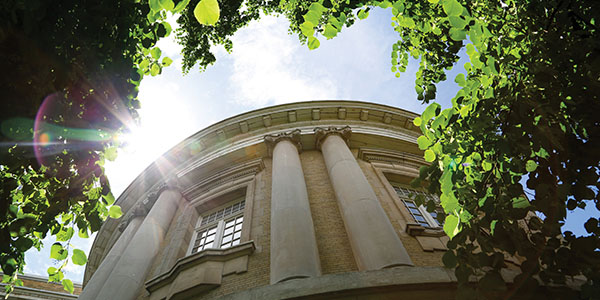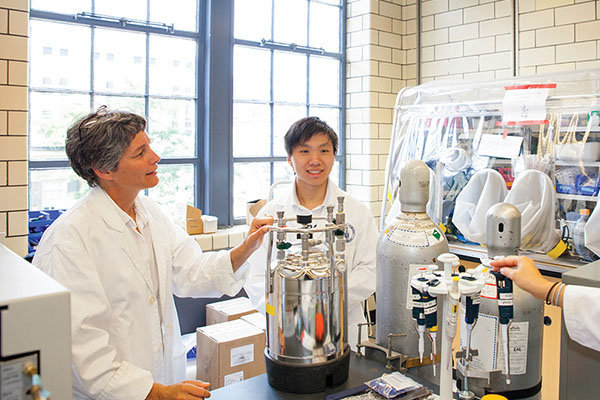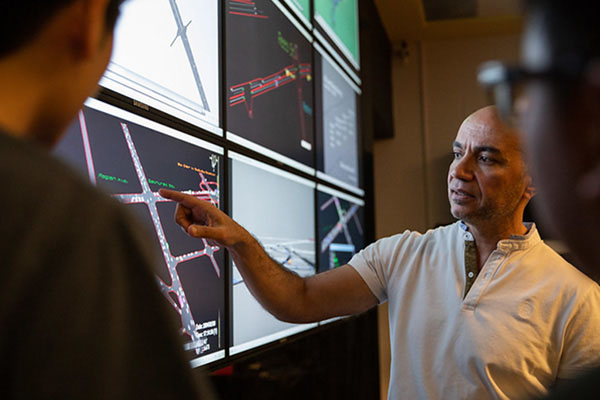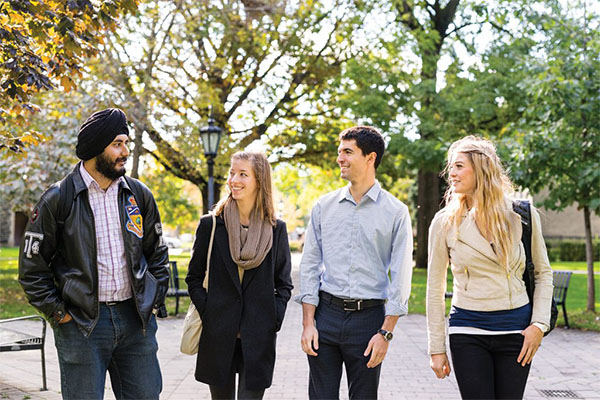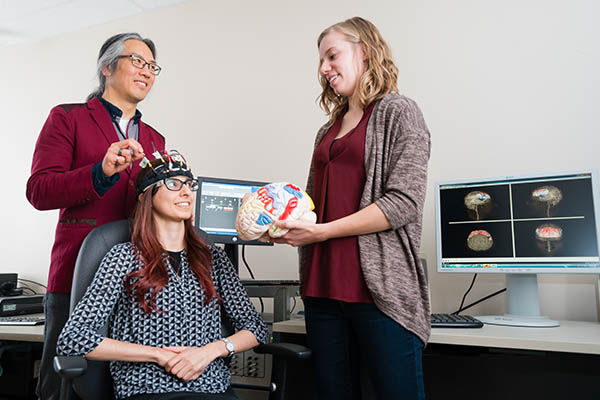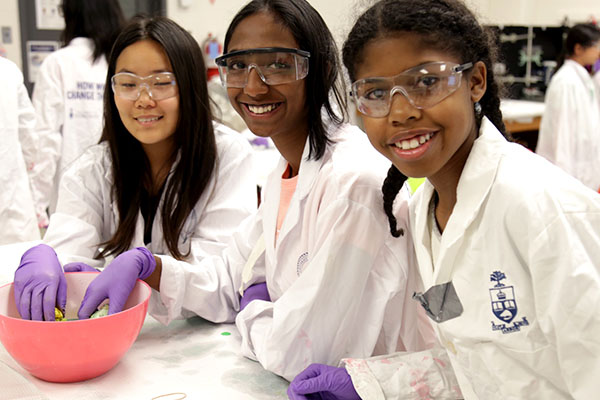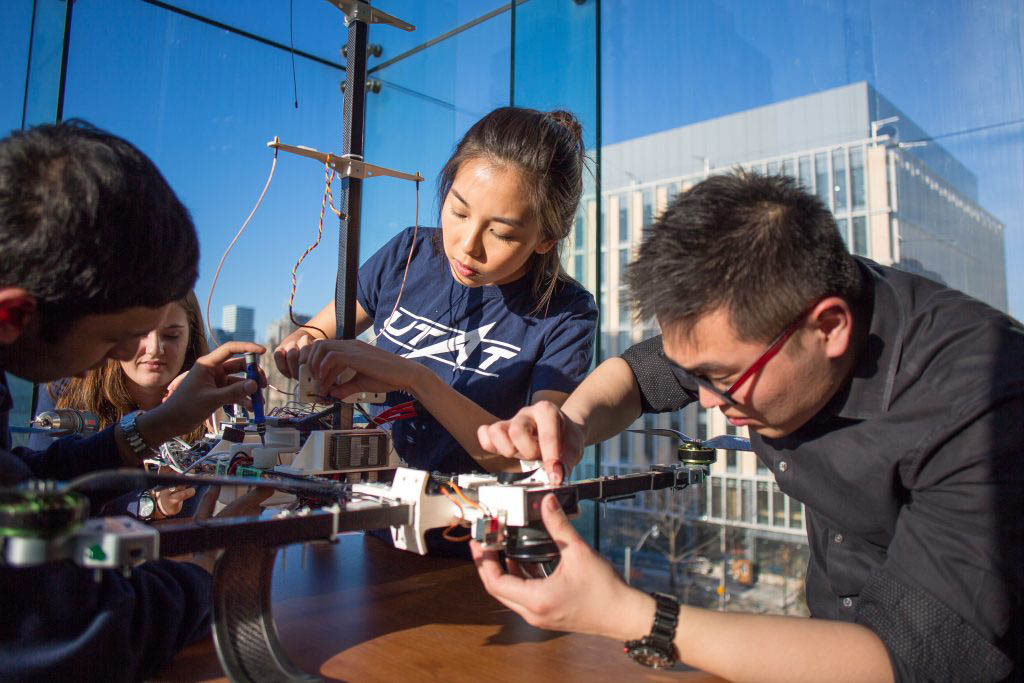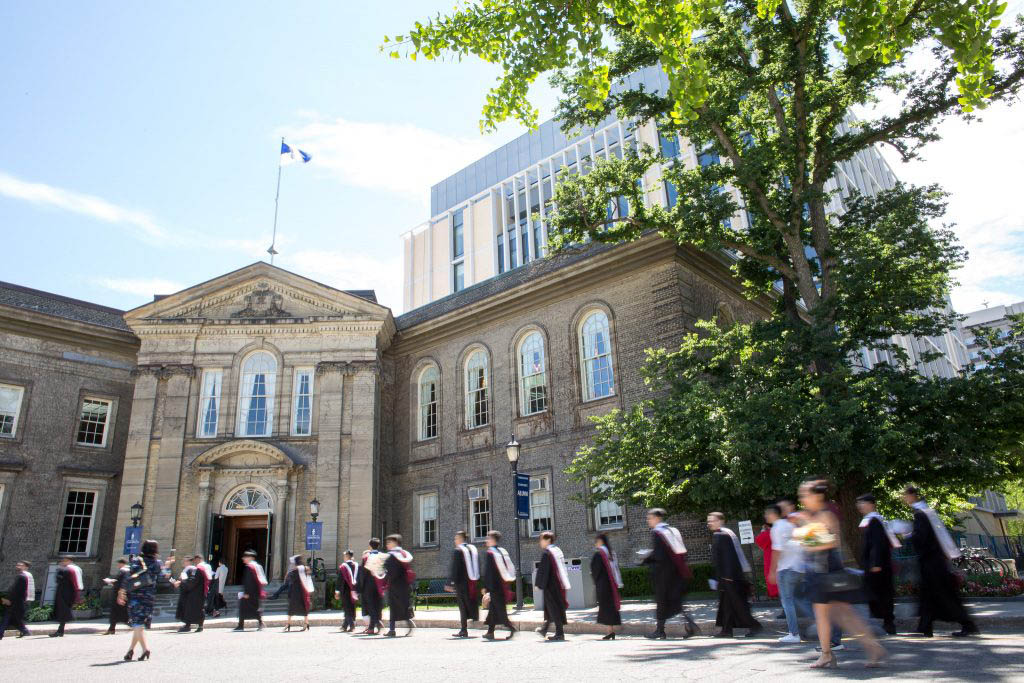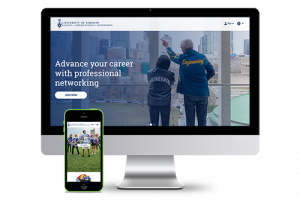As part of the Faculty’s commitment to improving Indigenous inclusion, all U of T Engineering faculty, staff and students are called upon to start or continue their personal journeys towards understanding and acknowledging Indigenous peoples’ history, truths and culture. Launched in summer 2021, the Indigenous Cultural Competency Toolkit has been created by and with Indigenous leaders to help guide your journey.
The toolkit includes workshops, events and self-educational tools that have been curated from consultations with U of T’s Indigenous Initiatives Office and Indigenous-identifying community members.
The toolkit builds on recommendations from the 2018 Blueprint for Action report created by the Eagles’ Longhouse Engineering Indigenous Initiatives Steering Committee, which identified the most imperative actions to (re)building relationships between U of T Engineering and Indigenous peoples. It also aligns with the Truth and Reconciliation Commission of Canada’s Calls to Action.
Progressing toward reconciliation
This work contributes to the goal of establishing a more united, equitable and inclusive U of T Engineering community. Learning the truths and working towards reconciliation are commitments made by the Faculty and these modules are a first step that require everyone’s effort and prioritization.
Participants must start with Module 1: Understanding and Acknowledging Truths. Students, staff and faculty are encouraged to complete this module within two months of starting. Talking circles led by Indigenous leaders will be organized throughout the next year to share experiences, learnings and progress and to come together and create personal goals to act on the Blueprint for Action report and advance Indigenous inclusion within the Faculty.
Program modules & dates
Please be aware that much of this content addresses painful themes that may be activating to survivors of trauma. Along the way, please practice self care and seek support as needed.
Module 1: Understanding & Acknowledging Truths
Reflecting on Indigenous Land Acknowledgements
- Facilitated by John Croutch, cultural competency training officer in U of T's Office of Indigenous Initiatives
- Guide to Acknowledging First Peoples & Traditional Territory
- Native Land Map
- Duration: 1.5 hours
Reconciliation: Walking the path of Indigenous allyship
What does it mean to be an ally to Indigenous peoples? Is it possible to call oneself an ally? Or can one only aspire to be an ally as allyship is a continuous process of self-reflexivity and learning and acting in a decolonial manner?
- Facilitated by John Croutch, cultural competency training officer in U of T's Office of Indigenous Initiatives
- Duration: 2 hours
Speaking Our Truths: The Journey Toward Reconciliation – Part 1
Participants must complete Part 1 before Part 2.
- Offered online through U of T’s Centre for Learning, Leadership & Culture
- Facilitated by John Croutch, cultural competency training officer in U of T's Office of Indigenous Initiatives
- Duration: 2 hours
Speaking Our Truths: The Journey Toward Reconciliation – Part 2
Participants must complete Part 1 before Part 2.
- Offered online through U of T’s Centre for Learning, Leadership & Culture
- Facilitated by John Croutch, cultural competency training officer in U of T's Office of Indigenous Initiatives
- Duration: 2 hours
Module 2: Participating in the Culture
The offerings in Module 2 are experiential in nature and self-directed.
Pow Wow Ceremonies
Learn more about pow wow ceremonial practices, history and protocols in advance of watching or participating.
- To find a Pow Wow near you and across Ontario, explore the Pow Wow calendar.
- Watch the U of T Indigenous Studies Students’ Union (ISSU) virtual Pow Wow (1 hr 9 mins)
Walking tour of Indigenous histories and geographies on the St. George campus
The tour will be led by Indigenous guides and feature stories of precolonial landscapes, Indigenous Knowledges, colonialism, and anti-colonialism at St. George campus. First Story Toronto is an Indigenous-led community-based organization that researches and shares Toronto’s Indigenous presence through popular education initiatives such as storytelling tours of the city and its freely-available smartphone application.
- Facilitated Professor Jon Johnson (Woodsworth College)
- Open to staff, faculty, students and alumni
- Duration: 2 hrs
Module 3: Increasing Self-Discovery
These resources are curated to continue and advance participants’ self-directed learning. Please be aware that much of this content addresses painful themes that may be activating to survivors of trauma. Along the way, please practice self care and seek support as needed.
Book: The Inconvenient Indian: A Curious Account of Native People in North America by Thomas King
Winner of the 2014 RBC Taylor Prize, The Inconvenient Indian is at once a "history" and the complete subversion of a history — in short, a critical and personal meditation that the remarkable Thomas King has conducted over the past 50 years about what it means to be "Indian" in North America.
Video: Indigenous Design, Ethics and Role Models
(58 minutes - Available to students, faculty and staff with a UTORid)
In November 2021, John Desjarlais (P.Eng., MBA) and Matthew Dunn (P.Eng., M.Sc.) — co-Presidents of the Saskatchewan Professional Chapter of the Canadian Indigenous Science and Engineering Society — delivered a talk to the U of T Engineering community on the connections between engineering and Indigenous peoples through design and ethics. This session is part of the Towards Inclusive Practices Series (TIPS) hosted by the Engineering Equity, Diversity, and Inclusion Action Group.
Paper: Decolonization is not a metaphor
Eve Tuck & K. Wayne Yang. Decolonization: Indigeneity, Education & Society Vol. 1, No. 1, 2012, pp. 1-40
Watch:
- (1 minute) A Canadian Heritage minute about Chanie Wenjack, one victim of the residential school system
- (6 minutes) The Stranger video, the first full chapter and song of The Secret Path, a graphic novel and album by Gord Downie that chronicles the story of Chanie Wenjack, a victim of the residential school system
- (10+ minutes) Residential school survivor stories
- (45+ minutes) First Contact, an Aboriginal Peoples Television Network series about changing the perspectives of non-Indigenous people
Film: Indian Horse (2017)
An adaptation of Richard Wagamese's award-winning novel, this moving and important drama sheds light on the dark history of Canada's Residential Schools and the indomitable spirit of Indigenous people. Viewer discretion advised.
First Story Virtual Campus Tour
Led by a group of Indigenous U of T students and young adults from across the Greater Toronto Area, these virtual tours celebrate the rich Indigenous history of the University’s three campuses and surrounding areas.
More resources
- Between 2007 and 2015, the Truth and Reconciliation Commission (TRC) of Canada travelled across Canada hearing from more than 6,500 witnesses and created a historical record of the residential schools system. Read the TRC’s full report and 95 Calls to Action.
- The Office of Indigenous Initiatives has complied a list of resources including books, articles and films (PDF)
- The Royal Alberta Museum has compiled a comprehensive Indigenous History Resource List. This curates recommended books, literature, films, radio, podcast and more materials for people of all ages.
Self care
It is encouraged that you engage in self care throughout your learning journey. You may wish to schedule 30 minutes of open time after each toolkit activity for reflection. Consider going for a walk, sitting quietly and taking a few breaths, talking to a friend or family member, or doing anything else that nourishes you. You may be unlearning what you were previously taught and learning hard truths about Canada. If you are experiencing any discomfort, please know that the following resources are available to you.
Help lines
- Canada Suicide Prevention Service at 1-833-456-4566 (24/7) or text 45645 (4 PM - 12 AM ET)
- Connex Ontario at 1-866-531-2600
- Hope for Wellness 24/7 Help Line for Indigenous people at 1-855-242-3310
- Indigenous Services Canada – Ontario region at 1.800.640.0642 provides non-insured health benefits mental health counselling to registered First Nations and recognized Inuit persons
- Missing and Murdered Indigenous Women and Girls (MMIWG) Helpline 1-844-413-6649
- Residential school survivors who need support can call the National 24-Hour Residential School Crisis Line at 1-866-925-4419
- 60s Scoop Peer Helpline at 1-866-456-6060
- Talk 4 Healing for Indigenous Women at 1-855-554-HEAL
- Telehealth Ontario at 1.866.797.0000
Resources
- U of T Employee and Family Assistance Program (EFAP)
- U of T Employee Wellness
- U of T Engineering Student Mental Health & Wellness
- U of T GECoS Mental Wellness Commission (Graduate Engineering Council of Students)
- U of T First Nations House Student Services
- U of T Indigenous Gateway
- U of T Supporting Aboriginal Graduate Enhancement (SAGE)
- U of T Centre for Indigenous Studies
- OISE Indigenous Education Network
- Ontario Indigenous Organizations
As a non-Indigenous person, how can I help?
Indigenous communities ask that you direct your support the following ways within your capacity. These two communiques from the Tḱemlúps te Secwepemc (Kamloops Indian Band) and the Cowessess First Nation provide further suggestions on ways non-Indigenous people can direct their support.
- Offer a kind ear to Indigenous friends and colleagues; now is not the time to ask questions but to take the initiative to lead your learning journey
- Uphold the heavy lifting already done by residential school survivors, intergenerational survivors and the TRC by reviewing the Truth and Reconciliation Commission (TRC) Final Report and Calls to Action
- Visit memorials, pay your respects, participate in gatherings when invited
- Be respectful of cultural protocols; Indigenous communities are the caretaker of their lands, seek their permission and approval
- Make a financial contribution to Indigenous-led organizations
- Offer your technical expertise to Indigenous communities
- Follow the latest news
Dates of significance
June – National Indigenous History Month
- A month to recognize the rights, histories and extraordinary achievements of Indigenous peoples in Canada, and to celebrate nationally and locally the unique cultures and perspectives of First Nations, Metis and Inuit communities
- The Government of Canada created a rich library of downloadable digital assets for a variety of channels (e.g., social media, virtual backgrounds) to acknowledge this month.
June 21 - National Indigenous Peoples Day
- Created in 1996 in consultation with many Indigenous groups, and held around the time of the summer solstice, the day celebrates the contributions of Indigenous peoples.
September 30 – Orange Shirt Day and National Day for Truth and Reconciliation
- Canada’s first National Day for Truth and Reconciliation is September 30, 2021. It was established by the Canadian Government to provide an opportunity to recognize and commemorate the tragic history and ongoing legacy of residential schools which more than 150,000 First Nations, Metis and Inuit children were forced to attend between the 1870s and 1997.
- September 30 is also known as Orange Shirt Day, a nation-wide movement rooted in the story of Phyllis Webstad who, in 1973, at the age of six, was forced to attend the St. Joseph Mission Residential School. In preparation for school, Phyllis' grandmother, despite limited means, purchased a brand new orange shirt that Phyllis coveted and was excited to wear to school. But on her first day, the orange shirt was confiscated by the staff and replaced with a uniform. Phyllis then associated the traumatic experiences she endured in the school with the colour orange. Read her story.
First week of November – Treaties Recognition Week
- Created in 2016, this day honours the importance of treaties and helps residents of Ontario learn more about treaty rights and relationships. By learning more about our collective treaty rights and obligations, we can create greater understanding and nurture these relationships
November 16 – Louis Riel Day
- Louis Riel was a great Metis leader who helped his people form a government and become part of the newly created Dominion of Canada in 1870. He was executed by the Canadian government in 1885 for defending Metis rights and way of life. The day recognizes the contributions and struggles of the Metis to Canada.
November 7 – International Inuit Day
- A day to recognize the cultures, histories, contemporary contexts and rich contributions of Inuit peoples and the relationship between Canada and the Inuit of Canada.
November 8 – Commemorating Indigenous Veterans
- Indigenous Peoples have a long history of defending Canada and supporting its war efforts abroad, including in the War of 1812, World Wars I and II, the Korean War and beyond.
Additional resources
Virtual backgrounds
Download the U of T Engineering virtual backgrounds to help spark a conversation about Indigenous days of significance in your next meeting or event.
Powerpoint presentation slides
Download and include these slides in your classrooms and meetings to encourage others within the U of T Engineering community to develop their Indigenous cultural competency
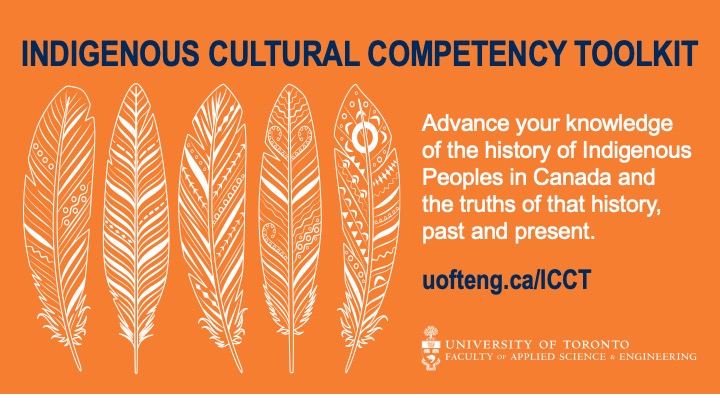
If you have questions or feedback, please contact Marisa Sterling, P.Eng., Assistant Dean and Director of the Office of Diversity, Inclusion & Professionalism or Professor Jason Bazylak, P.Eng., Dean’s Advisor on Indigenous Initiatives
Share this page: https://uofteng.ca/icct



